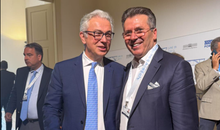
 Flash News
Flash News
Symbolic or essential? The risk of women's representation in the new Parliament

In the new parliamentary legislature that begins in September, 50 women MPs who won their mandates in the May 11 elections, after their competition on closed and open lists, are expected to sit.
The Socialist Party has the highest number of representatives with 35 women elected from a total of 83 MPs, followed by the Democratic Party and the “Alliance for a Greater Albania” coalition with 13 women and the Social Democratic Party with 2 women MPs from a total of 3 mandates. Another female candidate from the “Albania Initiative” coalition is also on the list of winners, but according to a pre-election promise, she may withdraw to make way for Adriatik Lapaj from the open list. Asked by BIRN whether he would take the mandate, Lapaj did not give a definitive answer.
Numerically, women and girls will make up 35 percent of the new parliament, or 5 percent more than the quotas dictated by the Electoral Code to ease the path for women's representation in politics. But for human rights activists, statistical representation is not enough if women and girls MPs do not also have a substantial representation with their own voice in parliament.
“There remains a real risk that this will be more symbolic than substantive representation,” Ines Leskaj, head of the Albanian Women’s Empowerment Network, AWEN, told BIRN, adding that “if women are elected to fill quotas but are not given real power to influence the political agenda, then progress remains superficial.”
According to Leskaj, this risks creating an illusion of equality, while the real power structures "remain unchanged."
Irena Shtraza, project manager at UN Women Albania, also believes that while increasing representation is a necessity, this should not be seen as a symbolic representation without real power. Shtraza also appeals that women's mandates in the Assembly should not serve only for gender balance.
"We hope," she says, "that they can have as much voice as possible and bring a new spirit to parliament, one that is in line with the interests of citizens and transcends party interests."
Real representation or an extension of the party?!
Most of the women who won the mandate of MP for the next four years have emerged from the safe lists of political parties, determined by party leaders and conditioned by legal provisions that require 1 in 3 candidates to be a woman.
Out of 50 MPs in total, 11 were elected from open lists, including only Jorida Tabaku from the opposition coalition and 10 other MPs from the Socialist Party.
The election of a majority of women as leaders of the main parties is considered a worrying element by civil society representatives, who emphasize the lack of internal democracy.
“The fact that most women are elected through closed party lists is a coin that has two sides,” said Ines Leskaj, who appreciates the fact that this system has helped increase women’s representation. But on the other hand, according to her, “it can limit their political independence, due to the dependence on the party leadership that controls the ranking on the lists.”
"Under these conditions, the risk that they will feel more like extensions of the party's will than as representatives of the interests of communities is there," suggests Leskaj.
Irena Shtraza from UN Women suggests that the problem of political independence does not recognize gender, but is related to the democratization of the parties themselves.
“The space to act independently and represent the interests of the electorate knows no gender,” said Shtraza, adding that both women and men must work together to create a political system built on the basis of equal opportunities and democracy.”
"Without reforms within parties and without space for independent elections by the electorate and independent action by those elected, representation may remain symbolic, for women and men alike," she stressed.
The same position is shared by Leskaj from the "AWEN" Network, who does not see quotas as the ultimate mechanism for increasing real gender equality in politics.
"If not accompanied by internal party democratization, transparency, and equal competition, they (closed lists) can strengthen top-down control," said Leskaj, adding that real gender equality in politics requires concrete support for building women's leadership and empowerment.
Meanwhile, Shtraza raises another concern about the May 11 elections; the lack of diversity and inclusive representation even within the group of elected women.
"Certain groups of women remain systematically excluded from political processes due to lack of opportunities, especially women with disabilities, Roma and Egyptian women, young women and women in rural areas," she stressed, referring to the failure to fulfill international commitments undertaken by the Albanian state. Reporter.al
Latest news


Not only the body, swimming also helps the brain
2025-07-05 21:02:49
"Be careful with the water", Alimehmeti warns about the health risks of summer
2025-07-05 20:39:10
PSG beats Bayern Munich 2-0, advances to Club World Cup semifinals
2025-07-05 20:19:38

Two vehicles collide on the Elbasan-Peqin axis, drivers injured
2025-07-05 19:26:29

What does Zelenskyy have more than Zegjineja?
2025-07-05 18:45:26

Fiscal peace, but at a cost
2025-07-05 18:00:10
'Bankers' tax evasion, Chinese CEO and former director jailed
2025-07-05 17:39:21
Kyle Walker joins English club on two-year deal
2025-07-05 17:20:24
Two cars collide on the Saranda-Delvina axis, 4 injured
2025-07-05 17:05:29
Touching gesture! Liverpool will pay Jota's family's salary until 2027
2025-07-05 16:45:18
The zodiac signs that cheat most often
2025-07-05 16:25:53

"I asked for the dismissals", Dredha tries to soften Rama's 'blow' in Vlora
2025-07-05 15:48:49
Bomb threat in Parliament, prosecutor: It was a lie
2025-07-05 15:22:28

Bardhi: The recount revealed how greedy Zeqine Balluku is in stealing
2025-07-05 14:44:29
Knife wound on the secondary road Tirana-Durrës, perpetrator sought
2025-07-05 14:37:54
Tears and pain, Diogo Jota is escorted to his final home
2025-07-05 14:21:34
Success starts with yourself! Simple ways to invest in personal development
2025-07-05 13:58:50
Unlicensed firearms found in apartment, 50-year-old arrested in Lushnje
2025-07-05 13:43:11

Tirana Court remands Skerdi Sina to prison
2025-07-05 12:59:34
Cocaine laboratory in Greece, here are the Albanians arrested and wanted
2025-07-05 12:40:16
Directed Justice/Vangjeli: SPAK does not investigate any scandal involving Rama
2025-07-05 12:22:03

Bomb alert, Police remove MPs and media from Kosovo Parliament building
2025-07-05 11:48:16
"The will of the people" and the irony of ordered resignations
2025-07-05 11:32:05
Summer drowning risk: How to enjoy the water without risking your life
2025-07-05 11:20:27
Fire situation in the country, 16 fires reported in 24 hours, 4 still active
2025-07-05 11:07:04
Car hits pedestrian at white lines, injured in serious condition in Vlora
2025-07-05 10:59:58
Mosquito-borne diseases are a growing problem in Europe
2025-07-05 10:44:13



One of Sweden's most dangerous and wanted criminals arrested in Turkey
2025-07-05 09:38:29
Foreign exchange/ How much foreign currencies are bought and sold today
2025-07-05 09:18:38

"Don't be influenced by the opinions of others", today's horoscope
2025-07-05 08:40:50

Morning Post/ In 2 lines: What mattered yesterday in Albania
2025-07-05 08:02:07

Trump says he's ready to raise tariffs to 70% on some countries
2025-07-04 22:35:52
Tre shenjat e zodiakut që do ‘pasurohen’ në Korrik
2025-07-04 22:05:09
Gaza War: Hamas Accepts US Proposal for 60-Day Ceasefire
2025-07-04 21:50:10
Autocracy in Albania, Fuga: Governance has gotten out of control
2025-07-04 21:40:51
Meta: Agriculture on credit, the new fraud!
2025-07-04 21:26:39




Vote recount in Durrës ends without changes
2025-07-04 20:12:54
Gas station explodes in Rome, 25 injured (VIDEO)
2025-07-04 20:00:20

These afternoon habits often sabotage weight loss
2025-07-04 19:39:28
Former Arsenal player Thomas Partey accused of rape
2025-07-04 19:24:21
Shepherd disappears without a trace in Delvina
2025-07-04 19:14:31

Bardho gave Zegjine's mandate/Braho: Unfair! It violates the electoral system
2025-07-04 19:01:08


Rapid developments in the Sultanates!
2025-07-04 18:00:06



Italy tightens rules for skateboard traffic
2025-07-04 17:20:18

Unusual for the time, dense fog covers the coast of Vlora
2025-07-04 16:48:01


Accident on the Shkodra-Lezhë axis, one dead and 3 injured
2025-07-04 16:14:19
Albania with fewer requests for asylum and Albanian citizenship in 2024
2025-07-04 16:06:57

Albania last for quality of life, DP: Technical government is the solution!
2025-07-04 15:42:30
Nico Williams says "No" to Barcelona, signs with Athletic Club until 2035
2025-07-04 15:33:35
Fires in the country, four fires are still active, what is the situation?
2025-07-04 15:24:20

Summer brings big changes for these 4 zodiac signs
2025-07-04 15:00:04
Osmani: MPs need to agree to a secret ballot for the Speaker of Parliament
2025-07-04 14:51:09
Serious accident on the Peqin-Elbasan axis, two injured
2025-07-04 14:37:56

GJKKO leaves in force the security measure for the head of the KPP
2025-07-04 13:58:17
Who will replace Ilir Meta and take over the leadership of the PL?
2025-07-04 13:50:36
Berisha: Dismissal of directors in Vlora, another act of 'scapegoats'
2025-07-04 13:41:46




Librazhd/ In a serious psychological state, the young man consumes pesticides
2025-07-04 13:05:07


Weapons trafficked from Kosovo to Albania, two arrested, 8 pistols seized
2025-07-04 12:33:28
Konsumimi i tepërt i çokollatës, ja cilat janë dëmet që shkakton në organizëm
2025-07-04 12:23:35

Fires in the country, 21 fires in the last 24 hours, 4 still active
2025-07-04 12:00:19
WB calls for debt transparency: Albania to publish details of every loan
2025-07-04 11:50:05
